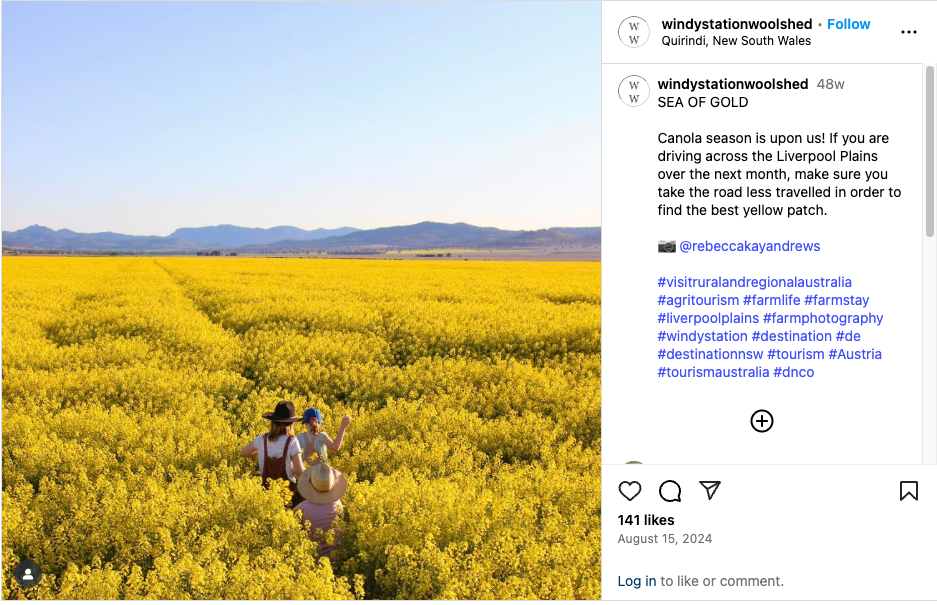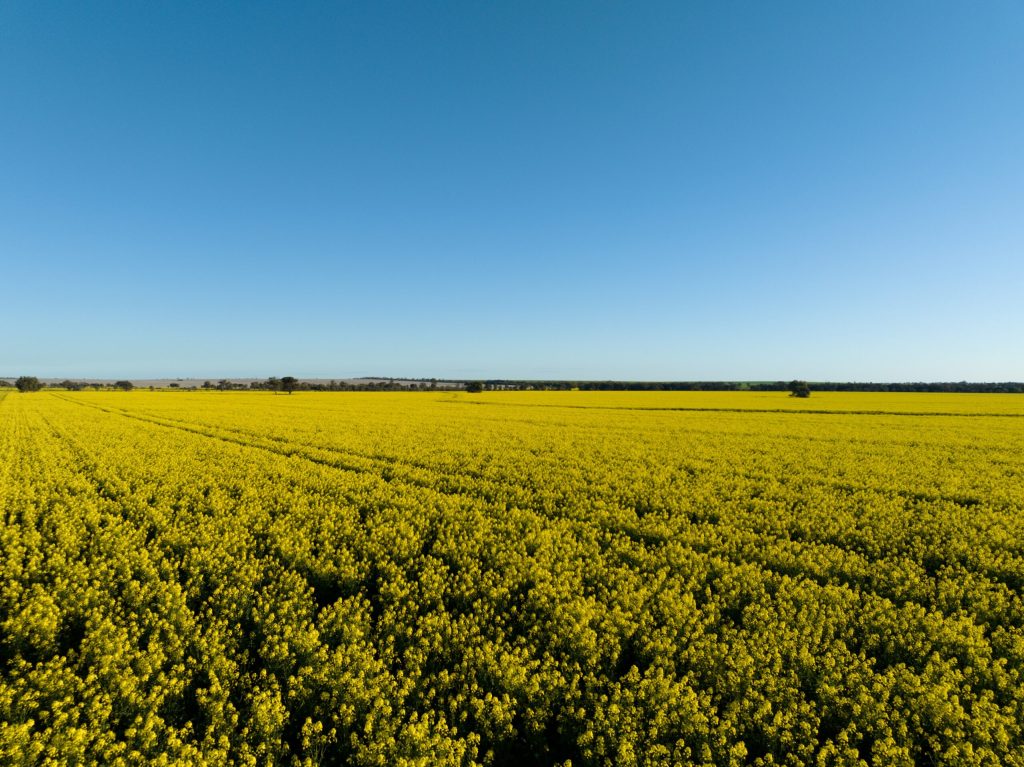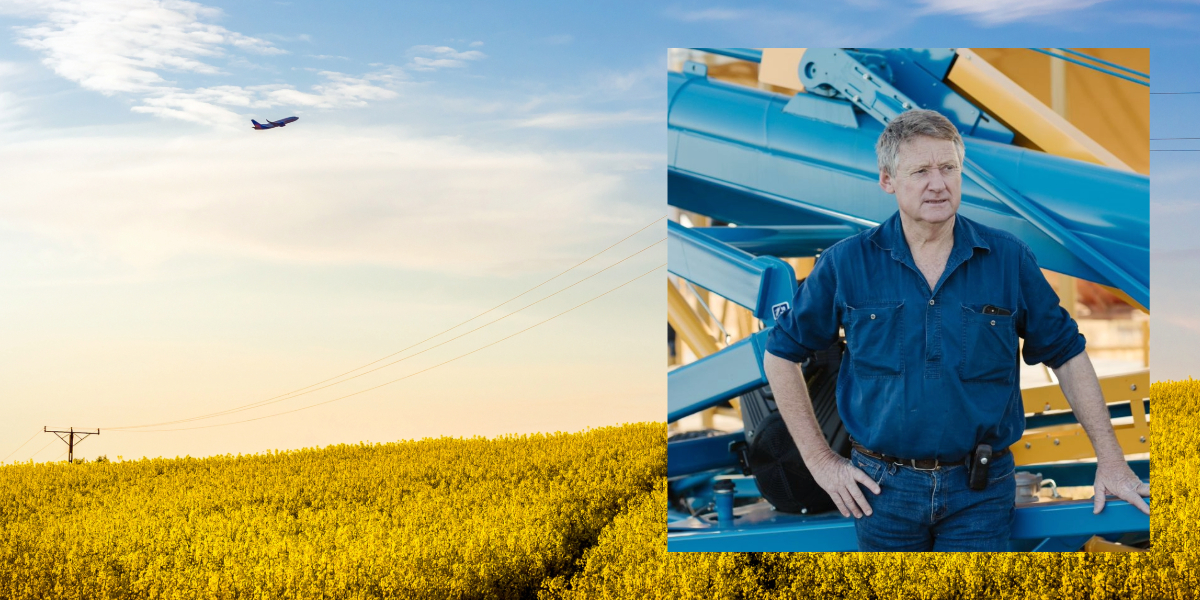Canola crops in the Liverpool Plains and the north west ‘Golden Triangle’ region could soon be fuelling the future of Sustainable Aviation Fuel (SAF) production in Australia.
Advocacy from farmer groups and a $250 million Federal Budget commitment to grow an Australian Low Carbon Liquid Fuels (LCLF) industry has launched the new market opportunity.
Qantas has also committed to using 10% SAF in its overall fuel mix by 2030 and private investors are in the planning phase for a new large-scale refinery to produce biofuel from crops like canola.
Moree farmer Matthew Madden said he is keen to get on board as new crop genetics enable more viable canola crops to be used in rotation with cereal crops in northern NSW.
Mr Madden planted 240 hectares of canola in April, which has just started to produce the yellow flowers that have made canola crops a tourist attraction and a popular social media backdrop.

“I’m looking forward to a future where we have a home-grown industry for SAF and other biofuels,” Mr Madden said.
“It creates a new market opportunity for our crops, and if Australian companies like Qantas are seeking to use SAF to reduce carbon emissions we should be the one’s supplying the feedstock to produce it.”
While Mr Madden’s 2025 canola crop will not be taking to the air, he will be advocating for prompt government action on kickstarting domestic SAF production through representing the northern NSW region with NSW Farmers and Grain Producers Australia.
National grower group Graingrowers has also stepped up its push for a national LCLF feedstock strategy that includes domestic SAF production. It has called for targeted grants for critical LCLF processing infrastructure such as fuel refining facilities and oilseed crushes.
Current biofuel production in Australia from crops primarily involves ethanol production from wheat starch and molasses. While Australia has significant grain and molasses resources, the production and consumption of biofuels remain relatively low.
Zach Whale, General Manager of Policy and Advocacy at Graingrowers, said SAF presents a ‘brilliant’ market diversification option for farmers using canola in cropping rotations.
“There is one big hungry market for Australian oilseeds, particularly in the EU. We export 70 per cent of our canola, much of which is used in flourishing biodiesel industry in the EU.”
“Our farmers are helping the EU meeting their carbon reduction targets. We should be doing the same thing here using feedstock from canola crops grown in regions like north western NSW.”
“Producing low-carbon liquid fuels from this feedstock can play a key role in meeting national emissions reduction targets while simultaneously boosting rural economies.”
Mr Whale said there are a couple of key hurdles to overcome before takeoff.
“The basic economics is one. It costs more to produce SAF than conventional fuel and no one wants to pay more for air travel and freight. That’s why government investment is critical to support the industry to get economies of scale.”
“There is enthusiasm from the federal government and private investors to achieve this.”
The economics are also why northern NSW is so important: the Golden Triangle region, roughly defined as the area east of the Newell Highway, stretching from Bellata to North Star and Yallaroi, encompasses around 350,000 hectares of some of the highest yielding cropping country in Australia.

Australian-owned fuel companies GrainCorp and Ampol have teamed up with industry super fund IFM Investors to work on refining canola oil in Australia for use in the aviation industry. GrainCorp’s aspirations are to establish a new canola crush with capacity to process 1million tonnes a year in NSW or Western Australia- the two biggest canola growing states.
“We also need to ensure our canola meets the technical certification criteria and mandates for aviation fuel,” Mr Whale explained.
In the Sustainable Aviation Fuel Roadmap published last year by the CSIRO, it was assessed that local SAF production would prove the most likely gateway investment in other fossil fuel replacements, such as biodiesel.
The same CSIRO research identified that just 4.5 million tonnes of canola could yield 2 million tonnes of lower-carbon liquid fuel, which is equivalent of around 250,000 return flights between Sydney and Melbourne.
NSW Farmers President Xavier Martin said further research and investment in the biofuels industry is essential to unlock the full potential and benefits of these alternative fuels.
“These fuels can be produced out of materials farmers already produce and can provide whole new income streams for farm businesses while slashing on-farm energy and fuel costs.”
“Biofuels could also play a key role in furthering the sustainability of the agricultural industry, with these fuels burning much more cleanly than fossil fuels and originating from renewable resources.”
Don’t miss any of the important stories from around the region. Subscribe to our email list.

